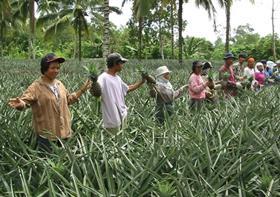
An ambitious plan to boost Mindanao’s fruit industry has been put forward by the Philippines’ agriculture department, involving new ports, highways and post-harvest facilities.
The plan is in response to complaints from fruit exporters about the poor infrastructure in the troubled southern island, reported the Business Mirror.
Philippine Agriculture Secretary Arthur Yap said the programme includes development of ‘food lanes’, a national business highway, between Luzon and Mindanao, infrastructure facilities including roll-in, roll-out (roro) ports, packhouses and other post-harvest facilities.
“Our programme for the fruit industry also aims to give assistance to exporters to reduce costs of shipping goods to markets overseas, including support in the conduct of pesticide residue analysis,” Mr Yap said.
“All these efforts and investments are designed to increase rural incomes and reduce the cost of doing business.”
Mindanao’s infrastructure has not received a high priority from the country’s government in the past, a consequence of the region’s political violence.
The island produces about 88 per cent of the Philippines’ pineapples, 81 per cent of its bananas, 22 per cent of its mangoes and all its durian, reported the Mirror.
“We will also ensure the delivery of timely market information, and provision of linkages that farmers need to make fruit farming profitable, productive, and globally competitive,” said Mr Yap.
He added fruit farmers needed to be trained in value-adding activities, such as counterseasonal planting and good agricultural practices (GAP), to be truly competitive on the global market.
“The DA can’t realize these imperatives alone. We recognise that a vital element in agricultural development is the need for greater private investments and the participation of local leaders,” Mr Yap stated.



